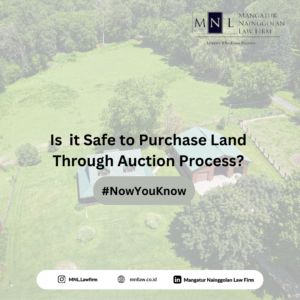Rights to Land that Can Be Encumbered with Encumbrance Right

According to Article 51 of the Basic Agrarian Law, the entitlements to land susceptible to encumbrance by encumbrance comprise ownership rights, rights of cultivation, and rights of building use. Regarding the right of occupancy, encumbrance by encumbrance is restricted solely to state-owned land deemed inherently transferable.
In the case of rights to use state land that cannot be transferred, such as the right to use in the name of the government, the right to use in the name of religious and social bodies, and the right to use in the name of foreign state representatives, then encumbrance rights cannot be encumbered. Meanwhile, for rights to use land with ownership rights, it is possible to encumbrance with encumbrance rights if the requirements have been fulfilled.
Legality of Execution Auction through KPKNL
In the conduct of auction proceedings, several auction organizers are recognized, namely:
(1) The State Asset Services and Auction Office (“KPKNL”);
(2) Auction Houses;
(3) Class II Auction Offices.
In accordance with Article 1, Number 11 of Minister of Finance Regulation Number 93/PMK.06/2010 regarding Auction Implementation Guidelines, KPKNL is delineated as a vertical institution within the Directorate General of State Assets, operating under the direct supervision of the Regional Office Head.
The auction process must be carried out by Auction Officials, that is:
- Class I Auction Officials, designated as employees of the Directorate General of State Assets, responsible for conducting all forms of auctions, including execution auctions, mandatory non-execution auctions, and voluntary non-execution auctions;
- Class II Auction Officials, private entities empowered to oversee voluntary non-execution auctions.
Article 6 of the Encumbrance Law delineates the execution of encumbrance rights, stipulating:
“In the event of debtor default, the initial Encumbrance Holder is vested with the authority to vend the encumbranced asset through public auction and recover outstanding debts from the proceeds of said sale.”
Hence, it is clear that the encumbrance execution process must be carried out through a public auction organized by KPKNL.
Requirements for Buying and Selling Land through Encumbrance Execution Auction Process
Essentially, in executing any legal transaction, compliance with the stipulations outlined in Article 1320 of the Civil Code is imperative, which encompass:
- Consent;
- Capacity;
- A Specific subject matter;
- A permitted cause.
Based on of the Civil Chamber Circular of the Supreme Court Number 4 of 2016 states that the valid requirements for buying and selling land must meet the following:
- Conducting the buying and selling of the land object with procedures and valid documents as stipulated by laws and regulations, namely:
– Purchasing land through public auction or;
– Purchasing land in front of the Land Deed Officer (in accordance with the provisions of Government Regulation Numver 24 of 1997) or;
– Purchasing land with customary ownership/unregistered land carried out according to customary law provisions, namely:
1) Done in cash and clear (in front of/know by the local Village
Head/Chief);
2) Preceded by an examination of the status of the land object of
the buying and selling based on the examination showing that the
land object of the buying and selling belongs to the seller.
– The purchase is made at a fair price - Exercising caution by examining matters related to the promised land object including:
1) The seller is the person entitled/owns the right to the land object of the
buying and selling, according to the proof of ownership, or;
2) The land/object being bought and sold is not under seizure status, or;
3) The land object being bought and sold is not under guarantee or
encumbrance status, or;
4) Concerning certified land, has obtained information from the National
Land Agency and the legal relationship history between the land and
the certificate holder.
It is important to emphasize that the requirements mentioned are alternative. It is crucial to pay attention if the land has records or a history of police cases, even though in such conditions, the encumbrance right can still be auctioned, but there is a potential for the new owner of the land to have difficulty registering the land as collateral because the notary will refuse to issue the Encumbrance Right Deed (APHT).
If you need legal consultation about any legal case, you can contact us through:
Email: secretary@mnllaw.co.id
Call: +62 21-3905928
